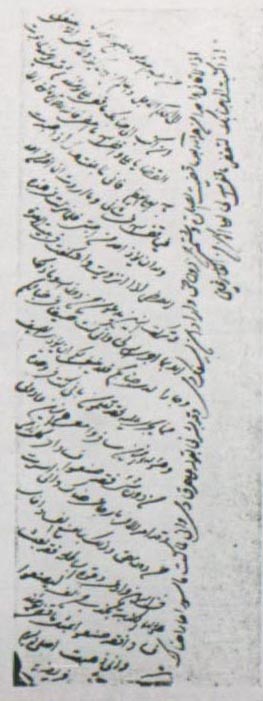Baha'i Allegations Against Subh-i Azal - Assassination Plots Against Subh-i Azal
12. Assassination Plots Against Subh-i Azal

Attempts by Baha’s men from Acre to assassinate Subh-i-Azal in Cyprus are admitted by Baha. Subh-i-Azal’s son-in-law Mirza Aqa Khan of Kerman, one of the co-authors of the Hasht-Bihisht (the Eight Paradises), visited Baha at Acre in about 1303 A.H. (1885-1886). He held several interviews with Baha. He drew up a report of his interviews with him.
Mirza Aqa Khan of Kerman quotes Baha as saying: (P 2, margin marked in pencil as “All years I have guarded him [i.e. Subh-i-Azal under my cloak. He is still under my protection; for, so many times many persons from Acre, without my knowledge, went to Cyprus to slay him, as soon as I came to know it I cabled immediately and restrained them from this business. In like manner I guarded Nasir al-Din Shah under my cloak for about thirty five years, otherwise they would have murdered him now several times.”
After the BÁBis were removed from Edirne in 1868 four partisans of Baha were ordered to depart for Cyprus, god passes by P. 181. They were Mirza Abd al-Ghafar known as Abdullah, Mirza Ali known as the Traveller (Sayyah), Mirza Muhammad Baqir, Baha’s coffee maker, and Mirza Husayn, the Calligraphist, known as Mushkin Qalam. Materials for the study of the BÁBi Religion by Prof. Browne, P. 44.
The British government took over the administration of the island from the Ottoman government in 1878.
Abd al-Ghafar escaped from Cyprus in 1870. Ali the Traveller died in Cyprus in 1871. Muhammad Baqir died in Cyprus in 1872. Mushkin Qalam left Cyprus for Acre in 1886. (The traveller’s Narrative, Prof. Browne’s note W, PP 386-389). Mushkin Qalam died in Acre.
Those four persons were interned in the fortress of Famagusta. Attached below is the facsimile of Subh-i-Azal’s autograph communication, addressed to the Ottoman governor of Famagusta.
After referring to his internment in consequence of Baha’s false pretensions, in the communication Subh-i-Azal calls the governor’s attention to one of the above-mentioned Baha’s four partisans, who “to-day after I had said my [Friday] prayers [in the mosque of Famagusta encountered me, ‘giving me the glad tidings’, according to him, ‘of shedding my blood.’ ”
The subject was Mirza Husayn, the Calligraphist known as Mushkin Qalam (Musk-Scented Pen).
On the strength of the quotation on pages 24 and 25 Subh-i-Azal was not left in peace even in Famagusta.
To read more about Baha'i Allegations Agsinat Subh-i Azal & the Edirne Period, got to the main page, select 'Bahaism -> Baha'i Allegations Agsinat Subh-i Azal' and navigate through the index.